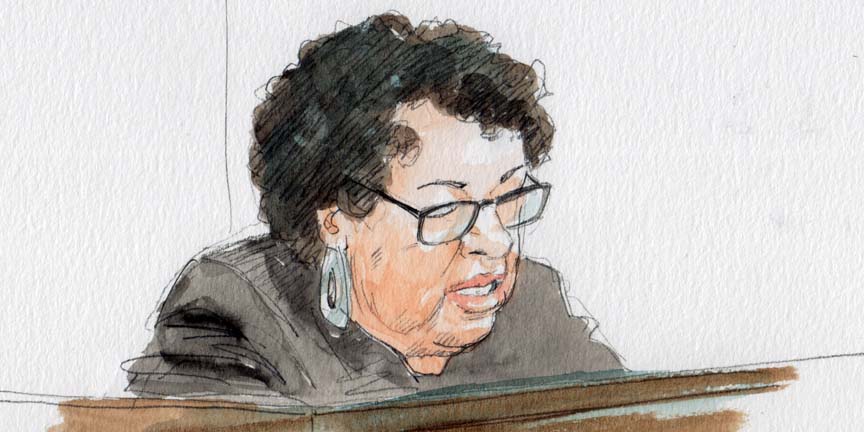Opinion analysis: Dismissal as untimely of Supplemental Security Income claimant’s request for review is final decision subject to judicial review
on May 29, 2019 at 8:55 am

Section 405(g) of the Social Security Act allows for judicial review of “any final decision … made after a hearing” by the Social Security Administration. Yesterday, in a unanimous opinion, the Supreme Court resolved in favor of the claimant, Ricky Lee Smith, a split among the courts of appeal as to whether a claimant has a right to judicial review under section 405(g) when the SSA’s Appeals Council dismisses the claimant’s request for review as untimely after the claimant has obtained a hearing before an administrative law judge.
The opinion, written by Justice Sonia Sotomayor, began with the text of the statute. The court had no difficulty finding that the Appeals Council’s dismissal of the claim fits within the term “final decision,” because the dismissal was the final stage of review. The court’s interpretation of the “after a hearing” requirement was a bit more nuanced. After observing that the phrase “has been the subject of some confusion over the years,” the court declined “to give section 405(g) a definition for all seasons” because in this case Smith had obtained the kind of hearing the statute “most naturally suggests: an ALJ hearing on the merits.” The court noted that the “after a hearing” requirement cannot be satisfied “as matter of mere chronology.” To allow that it could be satisfied that way risks “untenable breadth.” Instead, distinguishing the case from Califano v. Sanders, which involved the denial of a petition to reopen, the court found that the final decision in this case was much more closely tethered to the relevant “hearing.” Moreover, the claimant’s access to “this first bite at the apple” is “a matter of legislative right rather than agency grace.”
Turning to the statutory context, the court found that both requirements for finality under the Administrative Procedure Act were met because the action “mark[s] the ‘consummation’ of the agency’s decision-making process,” and is “one by which ‘rights or obligations have been determined,’ or from which ‘legal consequences will flow.’” The court acknowledged that the Social Security Act is a different statute from the APA and “courts must remain sensitive to their differences.” In this instance, the court noted, some of these differences indicate that Congress sought more oversight by the courts rather than less, and Congress designed the Social Security Act as a whole to be “unusually protective” of claimants. The court would not presume that Congress intended to leave claimants without recourse when the agency makes mistakes, as it inevitably will.
The court then found that Smith’s right to judicial review was consistent with “’the strong presumption that Congress intended judicial review of administrative action’” and that the heavy burden for rebutting that presumption had not been satisfied. Although Congress has granted the agency the power to establish the procedure by which individuals may claim benefits, Congress has not suggested that the Social Security Administration should be the sole arbiter of whether a claimant has satisfied those procedures.
The court then turned to consider the arguments offered by Deepak Gupta, the amicus curiae appointed to defend the judgment below after the government agreed with the claimant that the dismissal in this case met the terms of Section 405(g). The court gave two reasons for rejecting Gupta’s claim that “final decision … made after a hearing” refers to a conclusive disposition, after exhaustion, of a claim for which the Social Security Act gives a claimant to a right to a hearing. First, under the court’s precedents, exhaustion is not a pure necessity for judicial review. Second, the dismissal in this case was not merely collateral. Rather, the dismissal terminated a procedure with a substantial record and on which considerable resources had been expended. The agency cannot preclude judicial review simply by stamping “untimely” on a request.
Responding to Gupta’s argument that a ruling in favor of the claimant would open the floodgates to a wave of litigation, the court observed that the number of dismissals for untimeliness is relatively small and that experience in the U.S. Court of Appeals for the 11th Circuit, which has allowed judicial appeal of untimeliness determinations since 1983, does not bear out that prediction. Finally, the court noted that, because related statutes each must be considered in light of “the particular administrative scheme at issue,” yesterday’s decision “hardly knocks loose a line of dominoes.”
The court then rejected Gupta’s argument that the agency’s longstanding interpretation of Section 405(g), before the government changed its position following Smith’s petition for certiorari, is entitled to deference. Declining to decide whether the statute is unambiguous or how to address this curious situation of an amicus seeking deference to a position the government rejects in its brief, the court found deference inappropriate because the scope of judicial review is not the kind of question Congress is presumed to have implicitly delegated to an agency.
Finally, the court addressed the scope of review on remand, a question on which Smith and the government disagreed. The court declared that a federal court would have jurisdiction to proceed to the merits of the claim. However, the court pointed out that reaching the merits when the agency has not first decided a question delegated to it would be contrary to fundamental principles of administrative law. Thus, “in the ordinary case,” a court should limit its review to the procedural question that was the basis of the dismissal and should permit the agency to address any substantive questions in the first instance. In the rare case, such as when the government joins a claimant in asking the court to address the merits, the court might appropriately consider the merits.
The outcome is not surprising in light of the clear text of the statute and the fact that neither party defended the judgment below.


